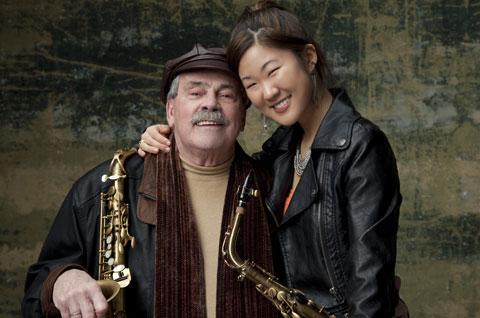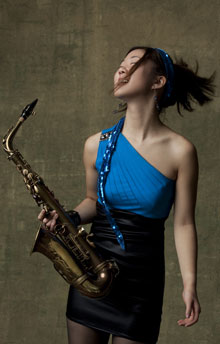
MASTER AND STUDENT Whatever Phil Woods and Grace Kelly play at Scullers, it won’t be “Twinkle, Twinkle, Little Star.” |
Legendary 79-year-old alto-saxophonist Phil Woods laughs indignantly when I ask him how he knew 18-year-old alto-saxophonist Grace Kelly was special. "Come on, when you hear it, you know what it is! I've been doing this for 65 years!" Pressed for particulars, he at first says, "Her maturity." Then he demurs. "It's not any one thing. She's got the whole kit."
Woods is the title character on Kelly's latest album, Man with the Hat, and the two come into Scullers Friday night as part of a short tour. This is Kelly's second outing with a venerable jazz master — the first was GRACEfulLEE with Lee Konitz. The freakish thing about these two CDs is that sometimes it's difficult to tell the master from the student. The warmth and weight of the introductory statement on the medium-uptempo title track from the new album, the spontaneous burst of filigreed ornaments, seem to say Woods. But it's Kelly, as is the assured, inventive solo that comes in after the theme.
"That happened to me!" says Woods about my confusion. "I did a showcase with Grace a couple of days ago, and I went back to check the CD, and I said, 'Oh yeah, that's me.' And it wasn't me!"
This isn't just a case of empty mimicry. It's natural for players in a section to blend. "It used to happen to me and Gene Quill," Woods recalls of his old section mate in the Woody Herman Big Band. For that matter, think of the cat-and-mouse Sonny Rollins and John Coltrane play on "Tenor Madness."
But I digress. The point is that Brookline resident Kelly is the real deal, and has been since she started turning the heads of her teachers and performing in public at the age of 10. In fact, for Boston audiences, the Grace Kelly story is even a little bit old. Man with the Hat is her sixth album on her own Pazz label, and she's been appearing at Scullers regularly since her first show there in March 2006 — a sellout. At every turn, people have been impressed with a child — and then a young woman — whose artistry is anything but rote.
The dirty little secret about child prodigies is that they work their butts off — you need only see the manuscript pages of the counterpoint exercises a five-year-old Wolfgang Mozart wrote for his exacting teacher, his father, Leopold. But when I visit Kelly at her family's store, the gift shop the Wild Goose, in Coolidge Corner, there is little sign of anxious stage parents or a stressed genius. Wiry, gray-haired, baseball-capped, her adoptive father, Bob Kelly, leads me down to the Pazz section of the basement offices. Glamorous on stage, Grace — on winter break from her junior year at Berklee — looks every bit the laid-back, bespectacled college student.

“I just played what I thought sounded good. That’s the biggest reason I had such a fascination with this music — there’s so much freedom to express anything at any time.” |
"When I got that horn," she tells me about her first alto, "the first week, I would open it every day and stare at it." When her lesson came, her teacher, James Merenda, showed her how to assemble it. "It's not hard," she says, "it's only two pieces!" But she was a bit in awe. She'd started taking classical piano lessons at six but had a tendency to go off the lesson plan, improvising her own tunes almost immediately. She loved saxophone — her jazz-fan parents played a lot of Stan Getz around the house. "He was the one who made me want to play." The Brookline public schools didn't have saxophone lessons, but they did have clarinet. "Clarinet was not easy at all. I squeaked." That lasted a year. Finally she began private lessons with Merenda, a ferocious improviser in his own right, and a mainstay of Boston's avant-garde scene.